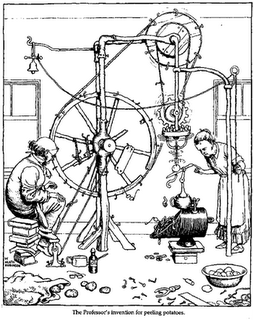 In spite of my antipathy towards the trappings of the monarchical system which holds this sad old country in its upper class grasp, I feel that I am now in with a shout for a deserved gong. There are some things which you achieve which are worthy of some sort of national recognition; by the sheer, breathtaking strength of character; the single minded dedication; the mould breaking behaviour and outright star quality you show that you are above the common herd. This quality can be shown in the most mundane surroundings, during the most ordinary activities. Take, for example, the supermarket.
In spite of my antipathy towards the trappings of the monarchical system which holds this sad old country in its upper class grasp, I feel that I am now in with a shout for a deserved gong. There are some things which you achieve which are worthy of some sort of national recognition; by the sheer, breathtaking strength of character; the single minded dedication; the mould breaking behaviour and outright star quality you show that you are above the common herd. This quality can be shown in the most mundane surroundings, during the most ordinary activities. Take, for example, the supermarket. Up with the lark (yet again) and, on the return trip, calling into Tesco for the baguette. As usual, I was too early for the early bread so had to made do with the much more solid and expensive organic alternative. And this is where the achievement happened. Although it is rare, you can sometimes make a light killing by taking some of the ‘bargains’ the Tesco put on their clearance shelves; you therefore need to take a trolley so that your ‘bargains’ will not suffer further deterioration and look like something scavenged from the waste bins. There were none. Nothing at all. Empty shelves. Wait for it. Almost there.
Up with the lark (yet again) and, on the return trip, calling into Tesco for the baguette. As usual, I was too early for the early bread so had to made do with the much more solid and expensive organic alternative. And this is where the achievement happened. Although it is rare, you can sometimes make a light killing by taking some of the ‘bargains’ the Tesco put on their clearance shelves; you therefore need to take a trolley so that your ‘bargains’ will not suffer further deterioration and look like something scavenged from the waste bins. There were none. Nothing at all. Empty shelves. Wait for it. Almost there.So, all I had in my trolley was one loaf; looking, as I am sure the evil geniuses in Tesco had planned, as lonely as a Philip Glass enthusiast in a Puccini Convention. Keep with me; we’re getting nearer to an explanation.
 We’re there! This is where the action of simple dignity took place. I walked out of Tesco with only a loaf of bread in my trolley; ignoring stares of bank disbelief on shocked faces; past trolleys looking more like the monolithic blocks being taken by oppressed slaves to a modern pyramid; past them all, with a loaf of bread. Not something my mother could have done: she would have been “ashamed” to have denied her buying gene to the extent of only finding a loaf of bread to buy! But I did it! I’d like a knighthood please.
We’re there! This is where the action of simple dignity took place. I walked out of Tesco with only a loaf of bread in my trolley; ignoring stares of bank disbelief on shocked faces; past trolleys looking more like the monolithic blocks being taken by oppressed slaves to a modern pyramid; past them all, with a loaf of bread. Not something my mother could have done: she would have been “ashamed” to have denied her buying gene to the extent of only finding a loaf of bread to buy! But I did it! I’d like a knighthood please.The past few days have been misty: that damp mist which gets straight though clothing to the very marrow of your bones. The quality of light is depressing too. The hell with the so called ‘soft’ days of the Irish; they are depressing but, in spite of this, or more likely, because of it, I used the Fifth Day of the Photographic Odyssey to find something of bright colour to enliven things.
When I first went to Turkey and in spite of my almost complete lack of artistic ability, I drew something every day that I was on holiday. I’d like to say that three weeks of practise meant that at the end of the time I produced effortless sketches which used line in new and exciting ways. But I didn’t. What I did do was look more closely at things like monumental guns, tasteless marble veneer memorials, tennis club chairs and a bottle of aftersun to ensure that I made a version of what I was looking at which bore some sort of resemblance to the object observed. I don’t think I had ever ‘looked’ so intently at anything on holiday before (even on revealing beaches, because, remember, I probably had my glasses off!) I am finding with the effort to produce photographs each day that I am reliving that intensity of observation.
 It was good to find a defiantly coloured plant to photograph, especially as I had previously thought that it was a weed, and I had only allowed it to continue to grow in the past two months because the greenery was so vigorous and comely! Other shots I took were similar to others taken earlier so I discarded them and concentrated on the non growing elements in the garden.
It was good to find a defiantly coloured plant to photograph, especially as I had previously thought that it was a weed, and I had only allowed it to continue to grow in the past two months because the greenery was so vigorous and comely! Other shots I took were similar to others taken earlier so I discarded them and concentrated on the non growing elements in the garden.I think the shot of the trowels is somewhat sinister, while the other shots are intriguing, though I’m not sure about their success. The portfolio is growing and I’ve taken the ultimate step and have taken one photo to be enlarged and framed. It is supposedly for a present, but time will tell.
Two books read this morning. The first was by Tom Baker (yes, that Tom Baker) called “The Boy Who Kicked Pigs”. It was a thoroughly uncomfortable read which I thoroughly enjoyed. It is ostensibly a children’s book, though there are telling moments which show that Baer is fully aware that adults will be reading it. Knowing the man, it is very easy to imagine his voice reading the words and there is an oral quality to the writing which gives it an added liveliness. It is formulaic, and it would never have existed without the disturbing quality which has been added to children’s writing by the enjoyably distasteful book by Roald Dahl. I thoroughly recommend it and the drawings by David Roberts are grisly and a more than adequate complement to the narrative.
 The other book was an impulse buy when looking for cds by Mecano: “Kant’s Very Large Morality Handbook” - the title sells it doesn’t it? Ironically it is quite small and even so the extracts from Kant’s philosophy are gnomic, at least to me. Far more understandable are the comments by the editor, Richard Osborne, throughout. There are also pictures (which take up space) and large hand drawn titles (which make it all seem trendy) and quotations by other philosophers (which are often funny) - so, all in all a good buy.
The other book was an impulse buy when looking for cds by Mecano: “Kant’s Very Large Morality Handbook” - the title sells it doesn’t it? Ironically it is quite small and even so the extracts from Kant’s philosophy are gnomic, at least to me. Far more understandable are the comments by the editor, Richard Osborne, throughout. There are also pictures (which take up space) and large hand drawn titles (which make it all seem trendy) and quotations by other philosophers (which are often funny) - so, all in all a good buy.Tomorrow Toni’s mum arrives and our hope is that she will demand to be tied to the kitchen to provide us with full examples of her expertise in Catalan Cuisine.
I shall eat for Wales!















































